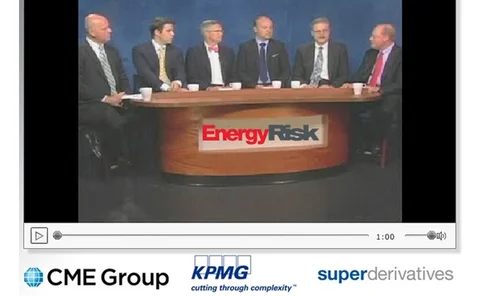Swaps
US energy firms cheer CFTC decisions on ‘swap’ definition, end-user exception
The US energy industry scores a victory as the Commodity Futures Trading Commission finalises two key pieces of Dodd-Frank derivatives regulation, modifying its original proposals to ease the compliance burden on firms that operate in physical energy…
Cost-benefit defeat weighing on "gun-shy" SEC
Slowly but surely
Volcker rule could hurt liquidity in FX spot market, participants warn
Foreign exchange swaps and forwards should be exempted from the Dodd-Frank ban on prop trading, or else liquidity in the spot market could suffer, industry participants say
The club no-one wants to join: swap dealer rules remain unclear
A club no-one wants to join
Tullett Prebon and Allianz to launch Solvency II data service
Benchmark OTC curves 'will help insurers calculate risk data for market risk models'
UK utilities face swap counterparty shortage
Bank downgrades could leave many structured finance transactions without acceptable swap providers - a potential nightmare for UK utilities
Energy Risk USA: CFTC to move quickly on swap definition – Berkovitz
The US Commodity Futures Trading Commission (CFTC) is very close to finalising its long-awaited definition of a swap, says CFTC general counsel Dan Berkovitz
CFTC Dodd-Frank rule-making to drag on until fourth quarter, says O’Malia
CFTC commissioner raises doubt over time line for Dodd-Frank Act – despite a proposed five-month delay
Partisan brief won't affect position limits lawsuit, says former CFTC chair
Brief filed by 17 Democrats at DC court will not influence court, says Sharon Brown-Hruska
CMS: covering all bases
CMS: covering all bases
The long and winding road to Dodd-Frank
The road ahead
European regulators undecided on initial margin rules for uncleared swaps
Counterparties will have to post variation margin on uncleared trades – but questions remain over which firms will have to post and collect initial margin
US energy firms lagging in Dodd-Frank readiness: survey
Two-thirds of upstream US energy companies have done nothing to comply with new regulations imposed by the Dodd-Frank Act, according to a new survey
Energy Risk Deals of the Year 2012: Credit Suisse's Urals swap with JKX
Credit Suisse’s $50m Urals Med swap with JKX Oil & Gas
Energy and Commodities OTC Clearing and Execution under Dodd-Frank Regulation roundtable
Challenges continuously arise regarding energy and commodities OTC clearing, and changes in regulations. This roundtable offers the knowledge, experience and opinions of our elite speakers on some of the key issues the industry currently faces including:
Legal & General produces first index for Source commodity ETF
Legal & General Investment Management has created a commodity index that serves as the basis for a new ETF launched in partnership with Source
Solvency II asset charges will not stop insurers providing bank funding, say economists
Demand for covered bonds and shorter duration corporate paper likely to increase, according to exclusive analysis by economists at Dutch central bank
Solvency II asset charges will not stop insurers funding banks
Strategic moves
Corporates complain about transparency of unwinds
Wound up by unwinds
Financial institutions move to address funding squeeze in Asia
Funding dilemmas
Despite hurdles, clearers map out forex ambitions
Clearing a way for forex
Energy experts debate merits of speculators and position limits
CFTC and Goldman Sachs executives discuss role of speculators in commodities markets during times of volatility
Despite hurdles, clearers map out forex ambitions
Clearing hurdles





















